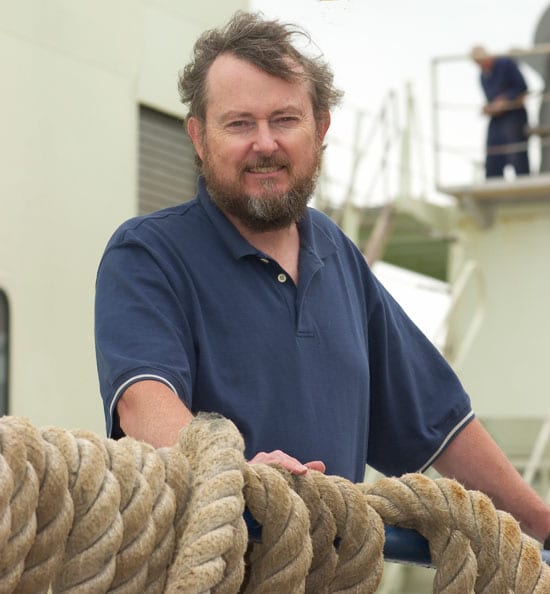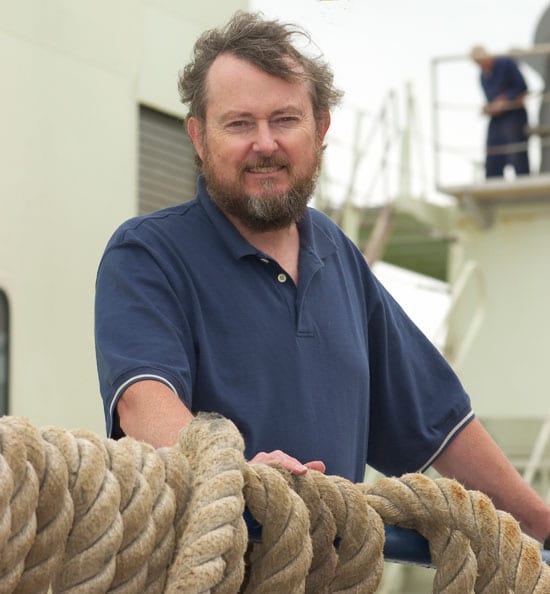John Toole Elected to the American Academy of Arts and Sciences
 Physical oceanographer John Toole was elected into the American Academy of Arts and Sciences, one of the nation’s most esteemed honorary societies and a center for independent policy research. (Tom Kleindinst, Woods Hole Oceanographic Institution)
Physical oceanographer John Toole was elected into the American Academy of Arts and Sciences, one of the nation’s most esteemed honorary societies and a center for independent policy research. (Tom Kleindinst, Woods Hole Oceanographic Institution) April 21, 2009
John Toole of the Woods Hole Oceanographic Institution (WHOI) has been elected a fellow of the American Academy of Arts and Sciences, one of the nation’s most esteemed honorary societies and a center for independent policy research.
Toole, a senior scientist in the Department of Physical Oceanography at WHOI, was elected as an American Academy Fellow for his outstanding contributions to his field. He is among 210 new fellows and 19 foreign honorary members considered leaders in the sciences, the humanities and the arts, business, public affairs, and the nonprofit sector to be elected this year.
“We at WHOI are proud and thrilled that John Toole has been elected to the prestigious American Academy of Arts and Sciences. Membership in the oldest scholarly society in the nation, in the company of the most distinguished thinkers and doers in the arts, humanities, sciences and public policy, is a rare privilege,” said WHOI Director of Research Larry Madin. “Toole’s pioneering and influential work in the physics of the Arctic Ocean is particularly relevant as we face radical climate changes in this crucial part of the globe.”
Toole earned a B.A. in physics from the University of Maine, in 1975, and a Sc.D. in physical oceanography from the Massachusetts Institute of Technology/Woods Hole Oceanographic Institution Joint Program in 1980. He joined the Institution staff in 1982 as an assistant scientist. The author or co-author of more than 60 scientific publications, Toole focuses his research on ocean general circulation; global heat and freshwater budgets; internal waves and turbulent mixing; and instrument development. He is the co-developer of the “ice-tethered profiler,” an instrument designed to be deployed on a weighted line hanging below an Arctic ice floe. The profiler collects information each day on its position in the moving pack ice, and takes measurements of seawater pressure, temperature, and salt content.
“It is a great pleasure to hear that Dr. John Toole has been made a Fellow of the American Academy of Arts and Sciences,” said Robert Weller, chair of the WHOI Physical Oceanography Department. “He has made significant contributions to our understanding of ocean circulation and has been at the cutting edge of developing tools for making new oceanographic observations.”
The American Academy of Arts and Sciences was established in 1780 by John Adams, James Bowdoin, John Hancock and other scholar-patriots. The current membership includes more than 250 Nobel laureates and more than 60 Pulitzer Prize winners. The Academy undertakes studies of complex and emerging problems in such focus areas as science, technology and global security; social policy and American institutions; the humanities and culture; and education. The Academy’s membership of scholars and practitioners from many disciplines and professions gives it a unique capacity to conduct a wide range of interdisciplinary, long-term policy research.
At the Academy’s induction ceremony on October 10 in Cambridge, Mass., Toole will sign the members’s register, a book that dates back to the 18th century, and will be presented with an official certificate.
The Woods Hole Oceanographic Institution is a private, independent organization in Falmouth, Mass., dedicated to marine research, engineering, and higher education. Established in 1930 on a recommendation from the National Academy of Sciences, its primary mission is to understand the oceans and their interaction with the Earth as a whole, and to communicate a basic understanding of the oceans’ role in the changing global environment.

